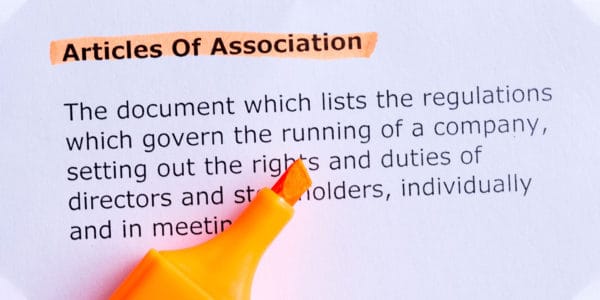In this blog, we will discuss the job of a company director in relation to a limited company registered in the UK. Becoming a director is very exciting and provides you with a prestigious status that’s sure to make an impression, but it also brings with it a high level of responsibility and trust.
Given the important nature of the role, it is vital to be aware of what it entails. This knowledge will ensure that you’re able to keep on top of your legal duties, do your utmost to make the company a success, and avoid the potential for personal liability.
Key takeaways
- Directors must ensure timely compliance with Companies House to avoid personal liability and legal penalties.
- Understanding the distinction between directors and shareholders is crucial for effective company management.
- Directors can safeguard against personal financial risks by obtaining Director’s and Officer’s Liability Insurance.
The job of a company director
In simple terms, company directors are the people who ‘direct’ the business on behalf of its members (shareholders/guarantors). They are legally responsible for all day-to-day management associated with running a limited company.
This includes buying and selling goods and services, taking care of finances and accounting matters, hiring and managing staff, keeping important business records, and ensuring that Companies House and HMRC are kept up to date with company information and trading activities.
Directors do not own the company – it is the members who own the business. However, directors and members are very often the same people.
Eligibility requirements – who can be a company director?
There are very few restrictions to becoming a company director, though certain people are prohibited from taking on the role, including:
- Persons under the age of 16
- Undischarged bankrupts
- Disqualified directors
- Any persons acting as auditor of the company
- Anyone who is subject to UK government restrictions
Whilst there are no formal qualifications required to be a company director, you must be prepared and fully committed to performing the duties and responsibilities of the role. Significant financial and legal penalties will apply if you fail to meet your obligations.
Minimum number of directors to set up a company
You only need one director (and one member) to register a private limited company in the UK, unless otherwise specified by the company’s articles of association.
This makes it a really great option for existing sole traders and those who wish to start a new business on their own because a director can also be a shareholder. As a result, a company can be set up with just one individual.
Duties and responsibilities of a company director
Directors are entrusted to run a company’s operations on behalf of the owners of the business. The extent of their authority depends on the powers they are granted by these owners.
The Companies Act 2006 outlines the general duties and powers that apply to all directors, which are:
- Duty to act within powers in accordance with the company’s articles of association
- Duty to act in good faith to promote the success of the company for the benefit of its members and the company as a whole.
- Duty to exercise independent judgement.
- Duty to exercise reasonable skill, care and diligence
- Duty to avoid conflicts of interest
- Duty not to accept benefits of bribes from third parties
- Duty to declare any personal interest in a proposed transaction or arrangement with the company.
The specific duties and powers of directors are company-specific and are stated in the company’s governing documents, the underlying one being the articles of association. Members can alter the articles at any time if they meet the minimum majority requirements.
As a company director, you will be expected to carry out some or all of the following duties to ensure that the business operates legally and successfully:
- All information requested by Companies House is submitted on time – this includes annual accounts and the confirmation statement.
- Notifying Companies House as soon as possible if any company details change, such as the registered office, information about directors and members, the company name, the type of business activities the company carries out, and the allotment or transfer of shares.
- Registering the business for Corporation Tax no later than 3 months after the date the company begins trading.
- Registering the company for VAT when annual taxable turnover exceeds £90,000
- Completing tax returns and accounts for HMRC.
- Keeping the company’s statutory registers up to date (register of directors, register of members, register of People with Significant Control).
- Complying with Health and Safety requirements.
- Registering the company as an employer if you hire any staff.
- Operating PAYE and running payroll
- Keeping all financial and accounting records, including invoices, receipts, loans agreements, and bank statements.
- Issuing dividend payments to shareholders
- Keeping a record of any decisions made at board meetings of the directors or general meetings of the members.
- Registering yourself for Self Assessment and sending a personal Self Assessment tax return each year
When a director does not have the power to make a certain decision, members must hold a general meeting to vote on the outcome of that particular matter. This usually only happens in extraordinary circumstances, such as changing the articles of association or removing a director.
Liabilities of a company director
The great thing about a limited company is that the company itself is responsible for its own debts. However, directors are personally responsible for ensuring the company complies with the law.
If you are negligent or act fraudulently in your capacity as a director, you could be personally liable and may face prosecution. You can get Director’s and Officer’s Liability Insurance to protect yourself against any such financial consequences you may face.
- Director disqualification and how it can affect you
- What’s the difference between company shareholders and directors?
- How to get information about a company director
In general, however, directors are not personally liable for company debts unless they own shares or have provided a personal guarantee for any of the debts. If you do own shares, you can be called upon to pay the nominal value of your unpaid shares.
If you fail to meet your financial obligations in your capacity as a guarantor, you risk losing the personal assets secured against the borrowing.
Disclosure requirements of a director
When you become a director of a limited company, you must provide certain personal information to Companies House. These details are automatically added to the public register of companies. This record is maintained by Companies House and it is available online to all members of the public.
The following details of every limited company director are included on this register:
- Full name
- Month and year of birth
- Nationality
- Service address
- Occupation
Your day of birth and home address must be provided when you are appointed as a director, but Companies House does not disclose this information. Your home address will only be shown on the public register if you use it as a service address or registered office.
It’s usually best to keep your residential address private. If you don’t have fixed business premises or you run your business from home, you can use a professional service address and registered office service.
Difference between a company director and member (shareholder/guarantor)
Members own the company; directors manage the company on behalf of members. To be a member, you must buy at least one share issued by the company (if it is limited by shares) or provide a financial guarantee to the company (if it is limited by guarantee).
It is very common for the same person to be both a member and director of a company. In fact, you can own and manage a company as a sole director and member.
Alternatively, a company can have multiple members and directors at any one time, and these people can change throughout the lifetime of the business. A limited company is a very flexible business structure in this sense.
Difference between a director and company secretary
All limited companies must have at least one director. A company secretary is optional for private limited companies. The role of the secretary is to assist directors with their duties, such as filing accounts and tax returns, reporting changes, filing Confirmation Statements, keeping company registers and accounting records up to date, etc.
A secretary does not hold the same powers as a director – they simply provide support. Companies will often appoint a secretary if the directors are unable to manage their workload.
Changing a director’s details at Companies House
If a director’s name, service address, or residential address changes, or the person leaves the company, you must tell Companies House immediately. This is to ensure that the information on public record is kept up to date. It’s very easy to report these types of changes.
The simplest way is to do it online through WebFiling or Quality Company Formations Online Company Manager, both of which are free of charge. Changes are usually updated on public record within 24 hours.
As a director, it is also your responsibility to record these types of changes (and the date on which they occur) in the company’s statutory register of directors. Whether kept as a hard copy or in electronic format, this register is usually kept at the registered office and must always be accurate and up to date.












Join The Discussion